AGL Energy's Sustainability Report: Contemporary Accounting Issues
VerifiedAdded on 2021/05/31
|13
|1065
|123
Report
AI Summary
This report delves into the sustainability reporting practices of AGL Energy, examining social and accounting issues and their implications for stakeholders. It assesses AGL's sustainability performance across customer, community, environment, economic, and people dimensions, noting adherence to GRI guidelines and assurance by Deloitte. The report highlights AGL's achievements in affordable energy solutions, community engagement, employee retention, and environmental performance. It identifies material issues such as public policy engagement, climate change, and ethical conduct, addressed through stakeholder engagement and materiality reviews. The company's community investments, including partnerships with organizations like Cancer Council Australia and The Smith Family, are also discussed. The report concludes with recommendations for improvement, focusing on reducing workplace behavior issues and increasing employee volunteering. Desklib provides access to similar reports and solved assignments for students.
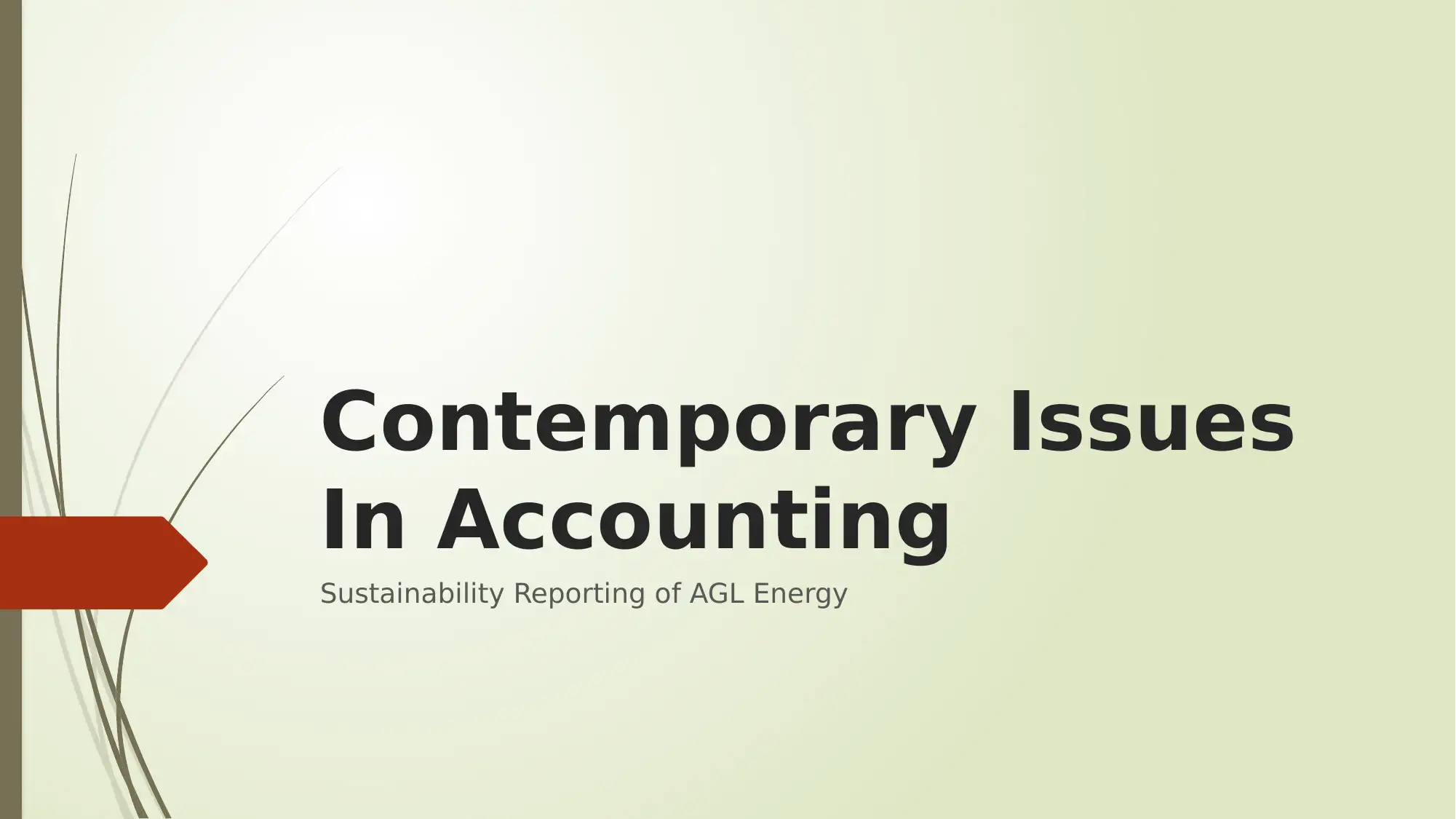
Contemporary Issues
In Accounting
Sustainability Reporting of AGL Energy
In Accounting
Sustainability Reporting of AGL Energy
Paraphrase This Document
Need a fresh take? Get an instant paraphrase of this document with our AI Paraphraser
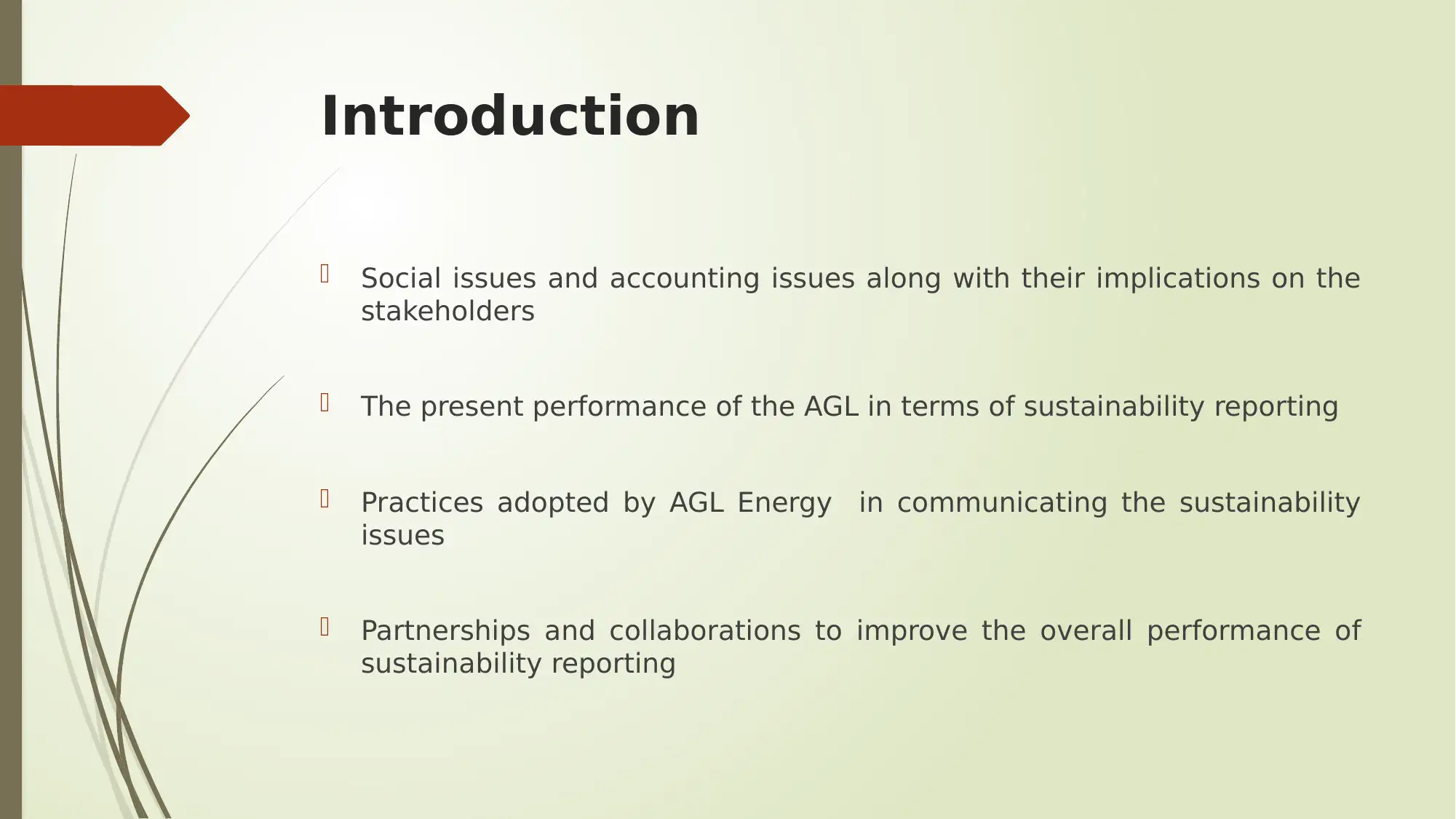
Introduction
Social issues and accounting issues along with their implications on the
stakeholders
The present performance of the AGL in terms of sustainability reporting
Practices adopted by AGL Energy in communicating the sustainability
issues
Partnerships and collaborations to improve the overall performance of
sustainability reporting
Social issues and accounting issues along with their implications on the
stakeholders
The present performance of the AGL in terms of sustainability reporting
Practices adopted by AGL Energy in communicating the sustainability
issues
Partnerships and collaborations to improve the overall performance of
sustainability reporting
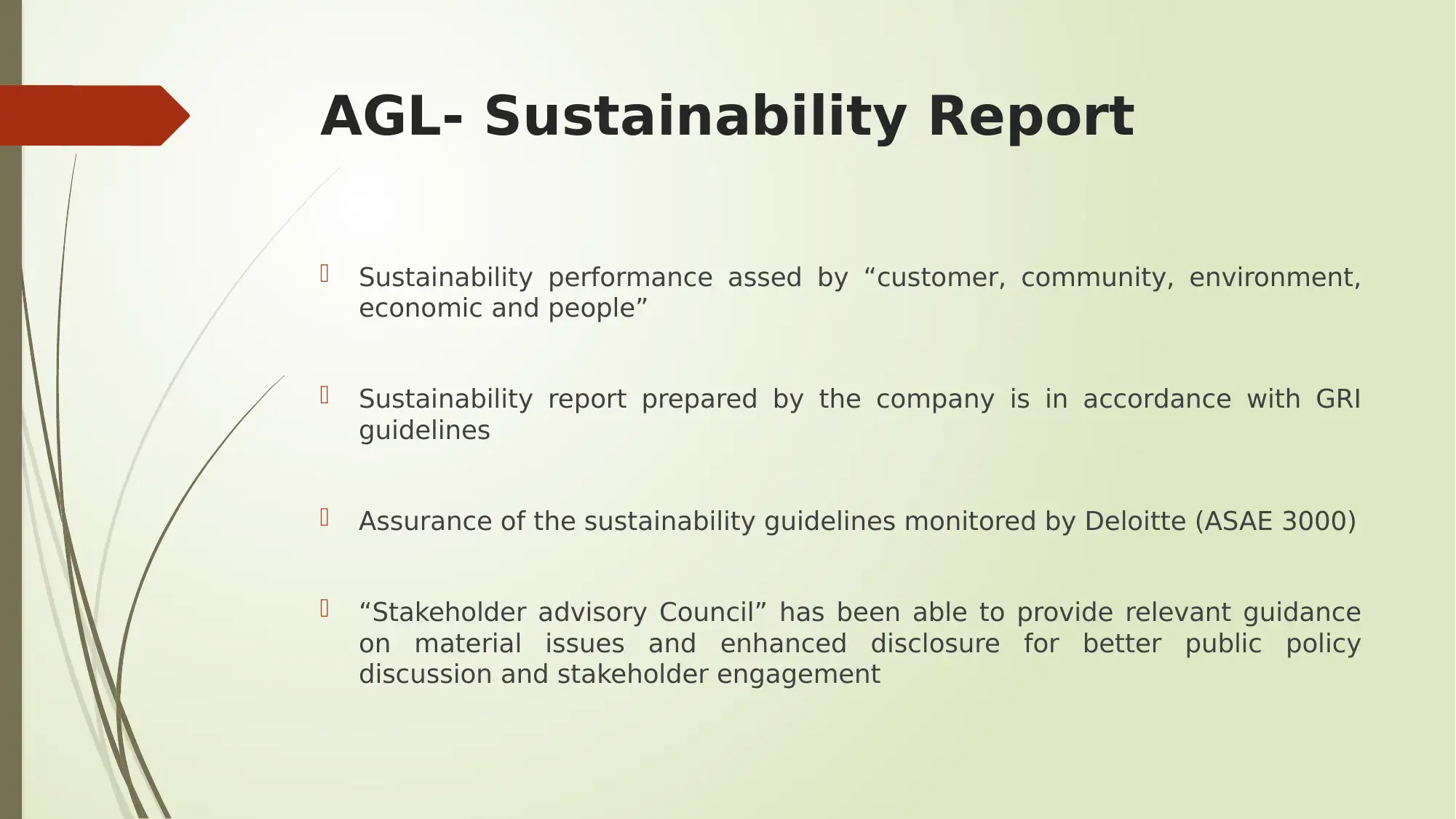
AGL- Sustainability Report
Sustainability performance assed by “customer, community, environment,
economic and people”
Sustainability report prepared by the company is in accordance with GRI
guidelines
Assurance of the sustainability guidelines monitored by Deloitte (ASAE 3000)
“Stakeholder advisory Council” has been able to provide relevant guidance
on material issues and enhanced disclosure for better public policy
discussion and stakeholder engagement
Sustainability performance assed by “customer, community, environment,
economic and people”
Sustainability report prepared by the company is in accordance with GRI
guidelines
Assurance of the sustainability guidelines monitored by Deloitte (ASAE 3000)
“Stakeholder advisory Council” has been able to provide relevant guidance
on material issues and enhanced disclosure for better public policy
discussion and stakeholder engagement
⊘ This is a preview!⊘
Do you want full access?
Subscribe today to unlock all pages.

Trusted by 1+ million students worldwide
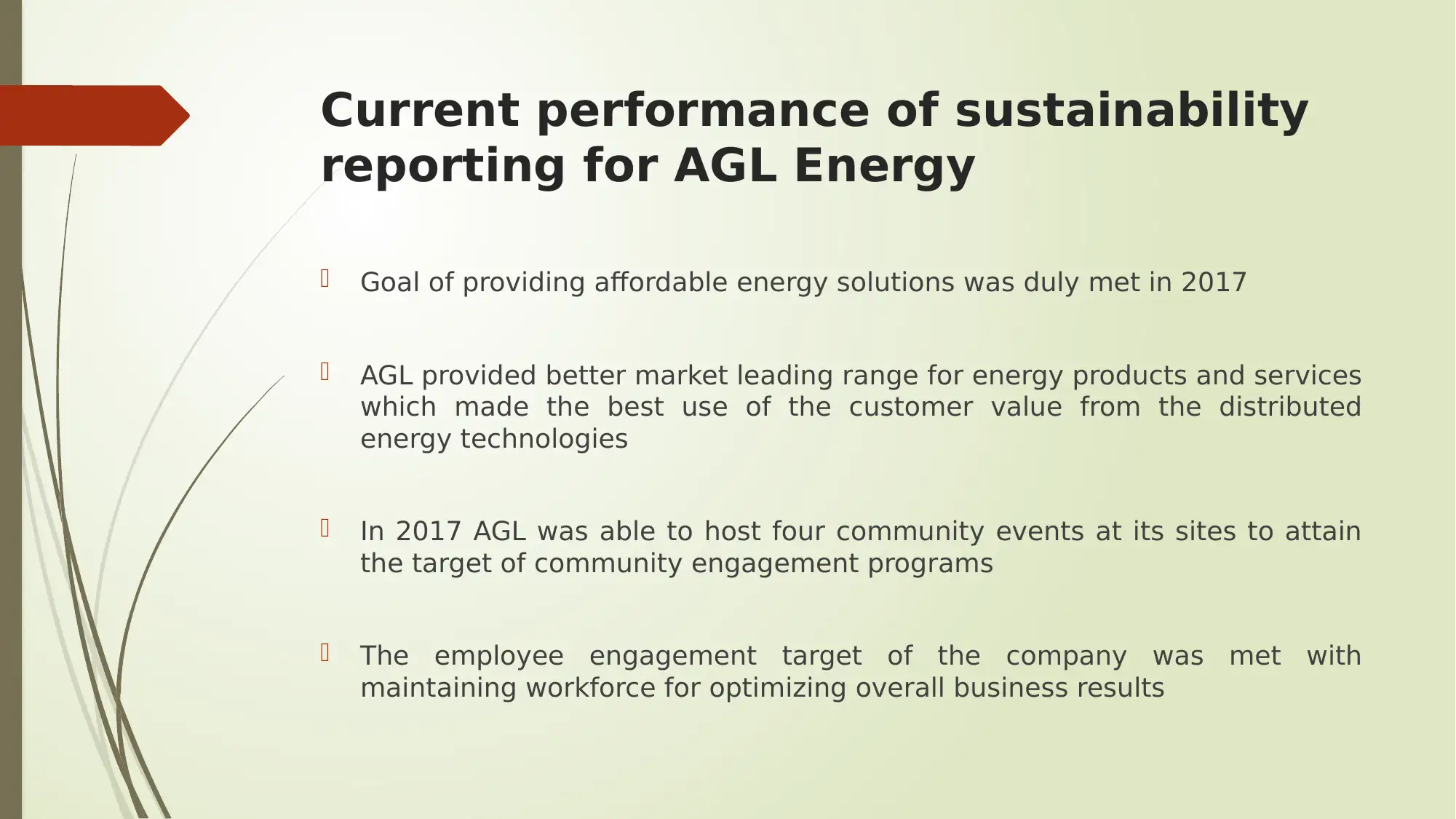
Current performance of sustainability
reporting for AGL Energy
Goal of providing affordable energy solutions was duly met in 2017
AGL provided better market leading range for energy products and services
which made the best use of the customer value from the distributed
energy technologies
In 2017 AGL was able to host four community events at its sites to attain
the target of community engagement programs
The employee engagement target of the company was met with
maintaining workforce for optimizing overall business results
reporting for AGL Energy
Goal of providing affordable energy solutions was duly met in 2017
AGL provided better market leading range for energy products and services
which made the best use of the customer value from the distributed
energy technologies
In 2017 AGL was able to host four community events at its sites to attain
the target of community engagement programs
The employee engagement target of the company was met with
maintaining workforce for optimizing overall business results
Paraphrase This Document
Need a fresh take? Get an instant paraphrase of this document with our AI Paraphraser
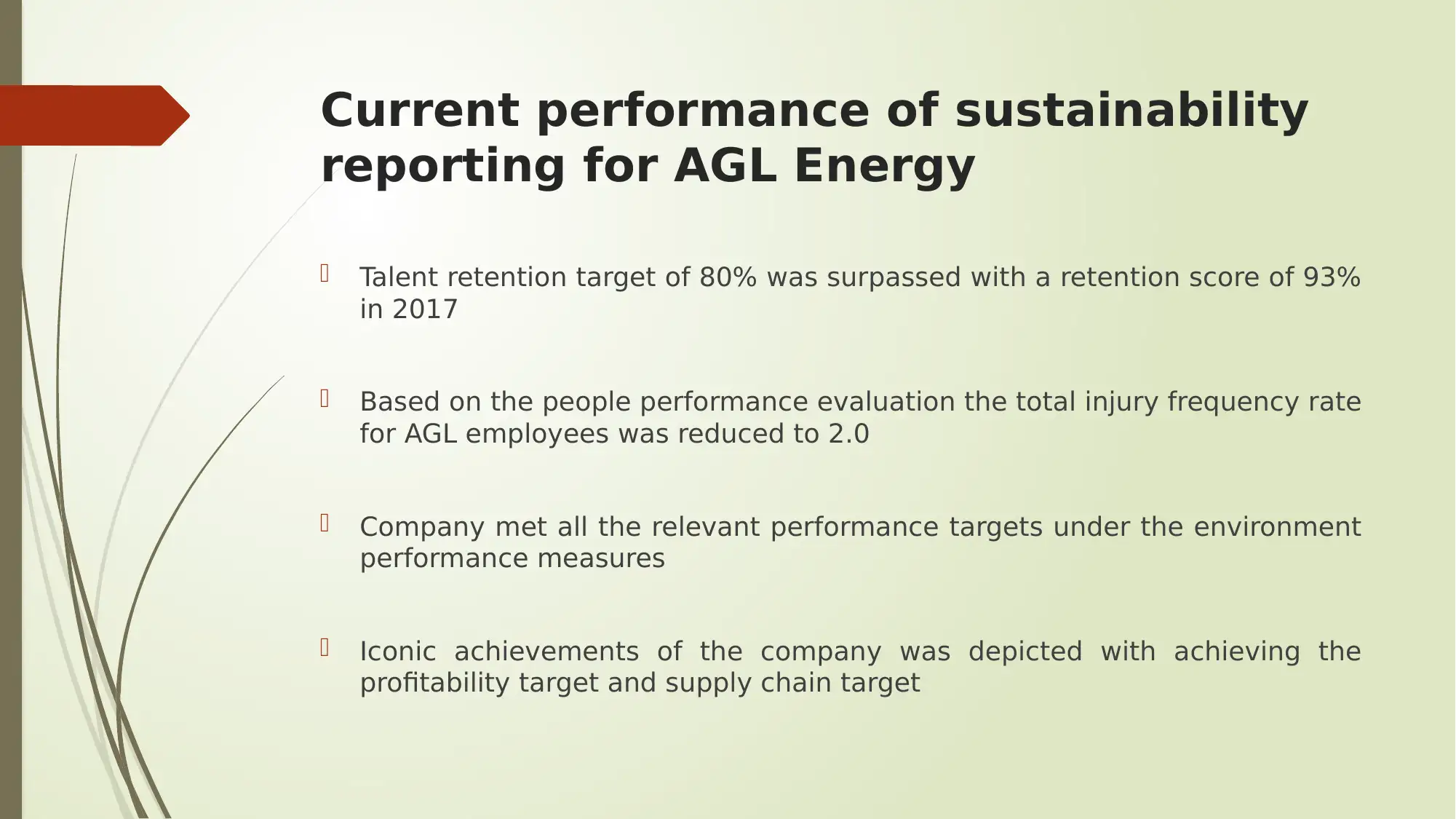
Current performance of sustainability
reporting for AGL Energy
Talent retention target of 80% was surpassed with a retention score of 93%
in 2017
Based on the people performance evaluation the total injury frequency rate
for AGL employees was reduced to 2.0
Company met all the relevant performance targets under the environment
performance measures
Iconic achievements of the company was depicted with achieving the
profitability target and supply chain target
reporting for AGL Energy
Talent retention target of 80% was surpassed with a retention score of 93%
in 2017
Based on the people performance evaluation the total injury frequency rate
for AGL employees was reduced to 2.0
Company met all the relevant performance targets under the environment
performance measures
Iconic achievements of the company was depicted with achieving the
profitability target and supply chain target
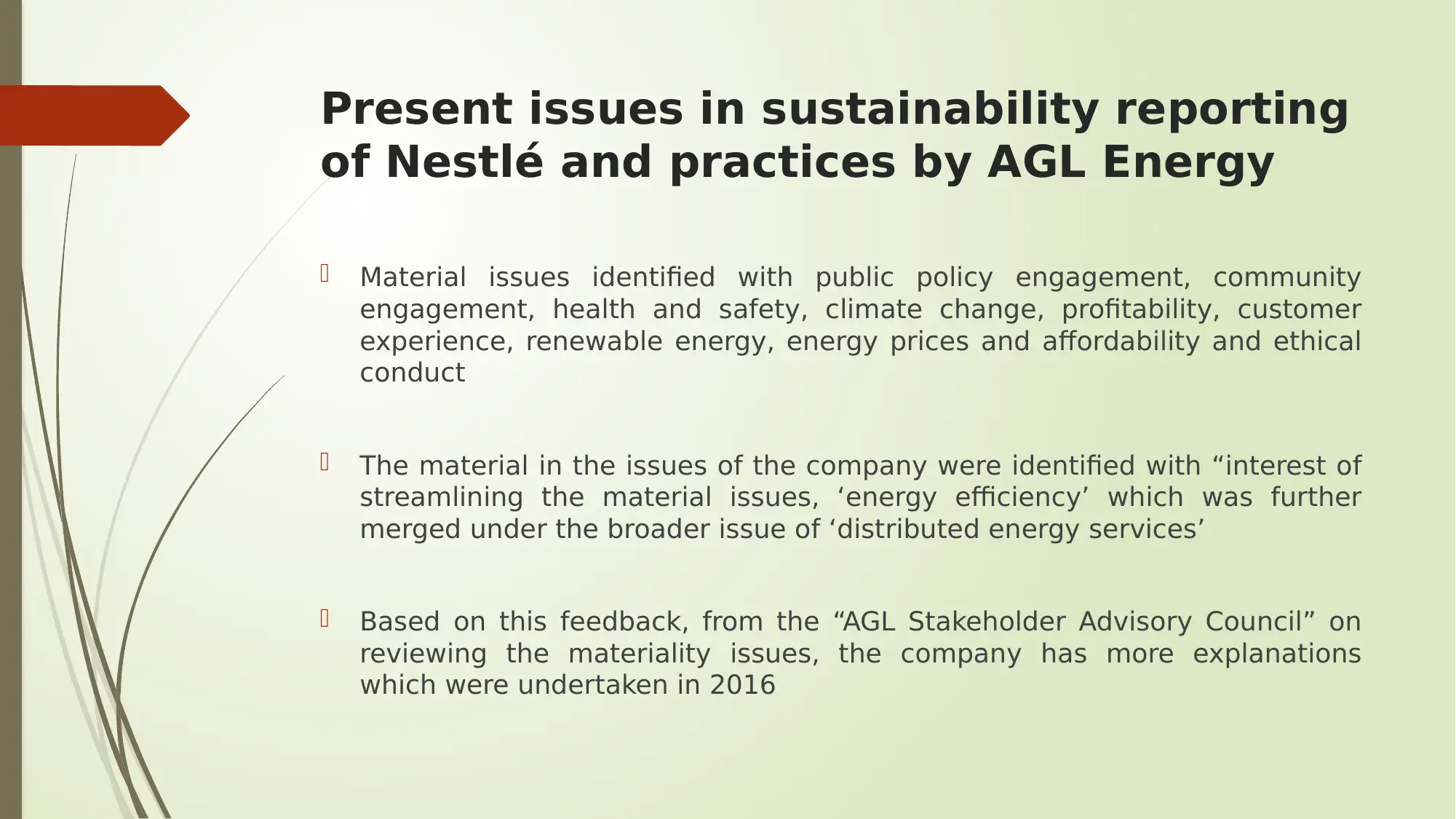
Present issues in sustainability reporting
of Nestlé and practices by AGL Energy
Material issues identified with public policy engagement, community
engagement, health and safety, climate change, profitability, customer
experience, renewable energy, energy prices and affordability and ethical
conduct
The material in the issues of the company were identified with “interest of
streamlining the material issues, ‘energy efficiency’ which was further
merged under the broader issue of ‘distributed energy services’
Based on this feedback, from the “AGL Stakeholder Advisory Council” on
reviewing the materiality issues, the company has more explanations
which were undertaken in 2016
of Nestlé and practices by AGL Energy
Material issues identified with public policy engagement, community
engagement, health and safety, climate change, profitability, customer
experience, renewable energy, energy prices and affordability and ethical
conduct
The material in the issues of the company were identified with “interest of
streamlining the material issues, ‘energy efficiency’ which was further
merged under the broader issue of ‘distributed energy services’
Based on this feedback, from the “AGL Stakeholder Advisory Council” on
reviewing the materiality issues, the company has more explanations
which were undertaken in 2016
⊘ This is a preview!⊘
Do you want full access?
Subscribe today to unlock all pages.

Trusted by 1+ million students worldwide
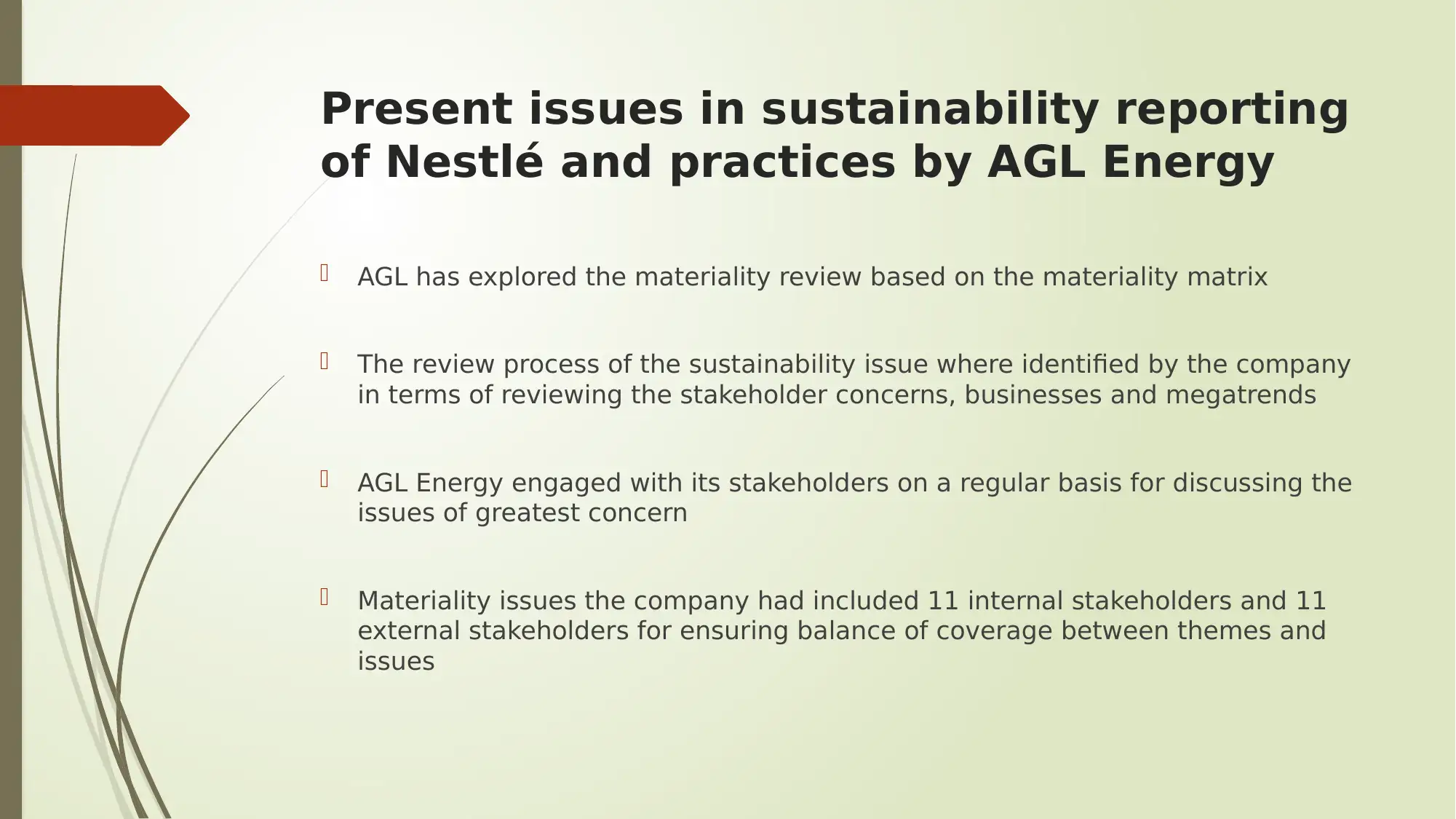
Present issues in sustainability reporting
of Nestlé and practices by AGL Energy
AGL has explored the materiality review based on the materiality matrix
The review process of the sustainability issue where identified by the company
in terms of reviewing the stakeholder concerns, businesses and megatrends
AGL Energy engaged with its stakeholders on a regular basis for discussing the
issues of greatest concern
Materiality issues the company had included 11 internal stakeholders and 11
external stakeholders for ensuring balance of coverage between themes and
issues
of Nestlé and practices by AGL Energy
AGL has explored the materiality review based on the materiality matrix
The review process of the sustainability issue where identified by the company
in terms of reviewing the stakeholder concerns, businesses and megatrends
AGL Energy engaged with its stakeholders on a regular basis for discussing the
issues of greatest concern
Materiality issues the company had included 11 internal stakeholders and 11
external stakeholders for ensuring balance of coverage between themes and
issues
Paraphrase This Document
Need a fresh take? Get an instant paraphrase of this document with our AI Paraphraser
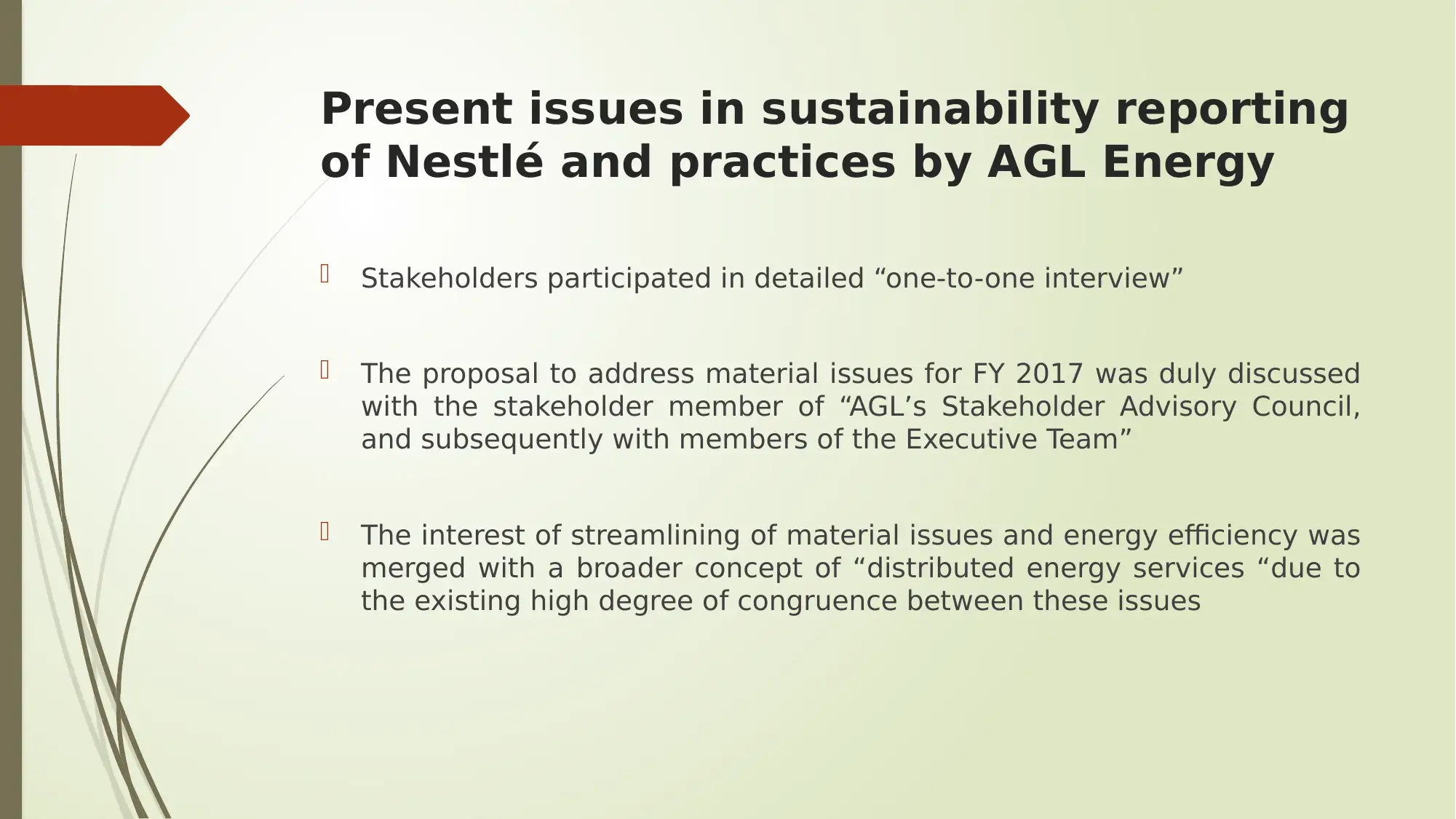
Present issues in sustainability reporting
of Nestlé and practices by AGL Energy
Stakeholders participated in detailed “one-to-one interview”
The proposal to address material issues for FY 2017 was duly discussed
with the stakeholder member of “AGL’s Stakeholder Advisory Council,
and subsequently with members of the Executive Team”
The interest of streamlining of material issues and energy efficiency was
merged with a broader concept of “distributed energy services “due to
the existing high degree of congruence between these issues
of Nestlé and practices by AGL Energy
Stakeholders participated in detailed “one-to-one interview”
The proposal to address material issues for FY 2017 was duly discussed
with the stakeholder member of “AGL’s Stakeholder Advisory Council,
and subsequently with members of the Executive Team”
The interest of streamlining of material issues and energy efficiency was
merged with a broader concept of “distributed energy services “due to
the existing high degree of congruence between these issues
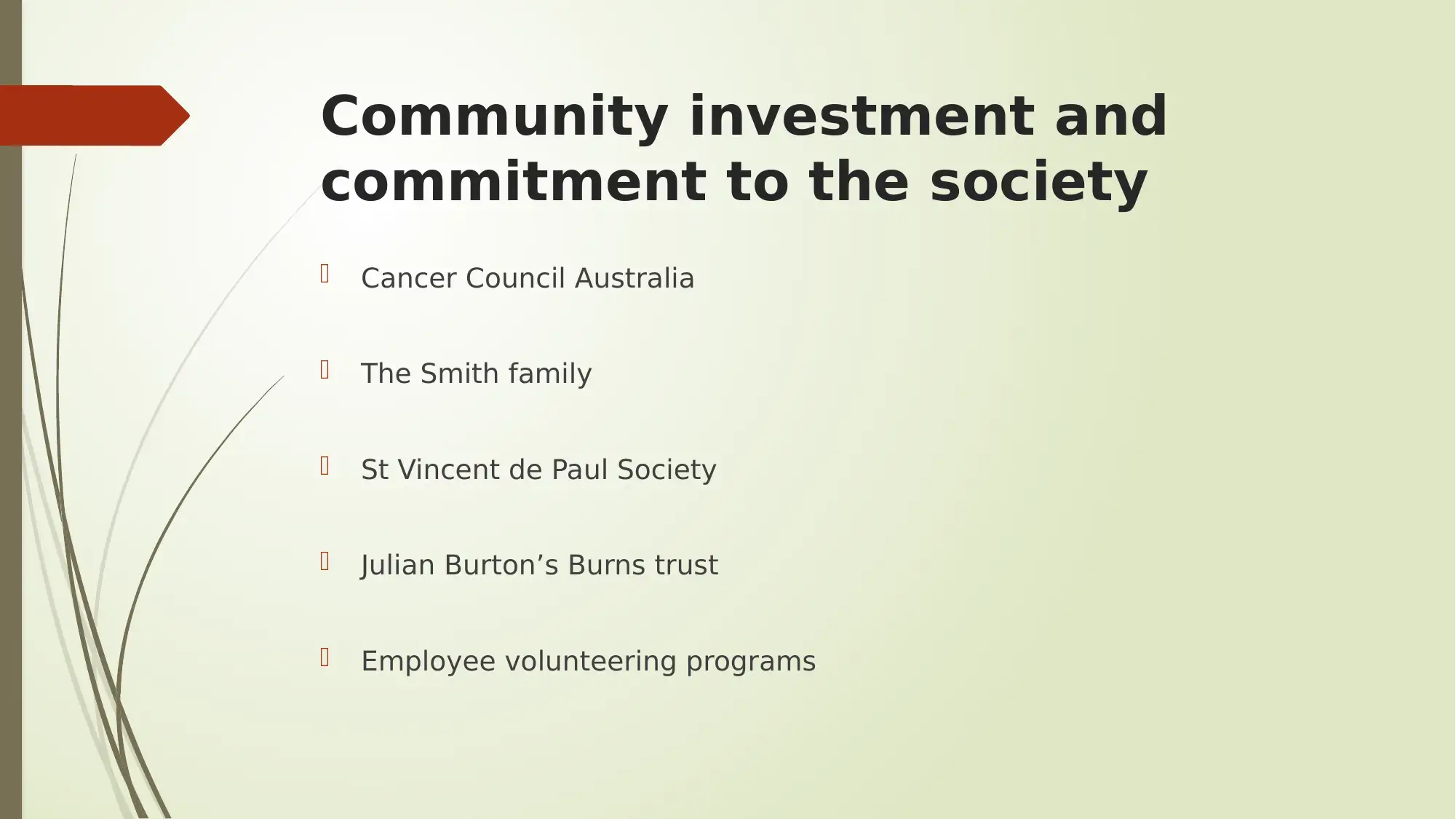
Community investment and
commitment to the society
Cancer Council Australia
The Smith family
St Vincent de Paul Society
Julian Burton’s Burns trust
Employee volunteering programs
commitment to the society
Cancer Council Australia
The Smith family
St Vincent de Paul Society
Julian Burton’s Burns trust
Employee volunteering programs
⊘ This is a preview!⊘
Do you want full access?
Subscribe today to unlock all pages.

Trusted by 1+ million students worldwide
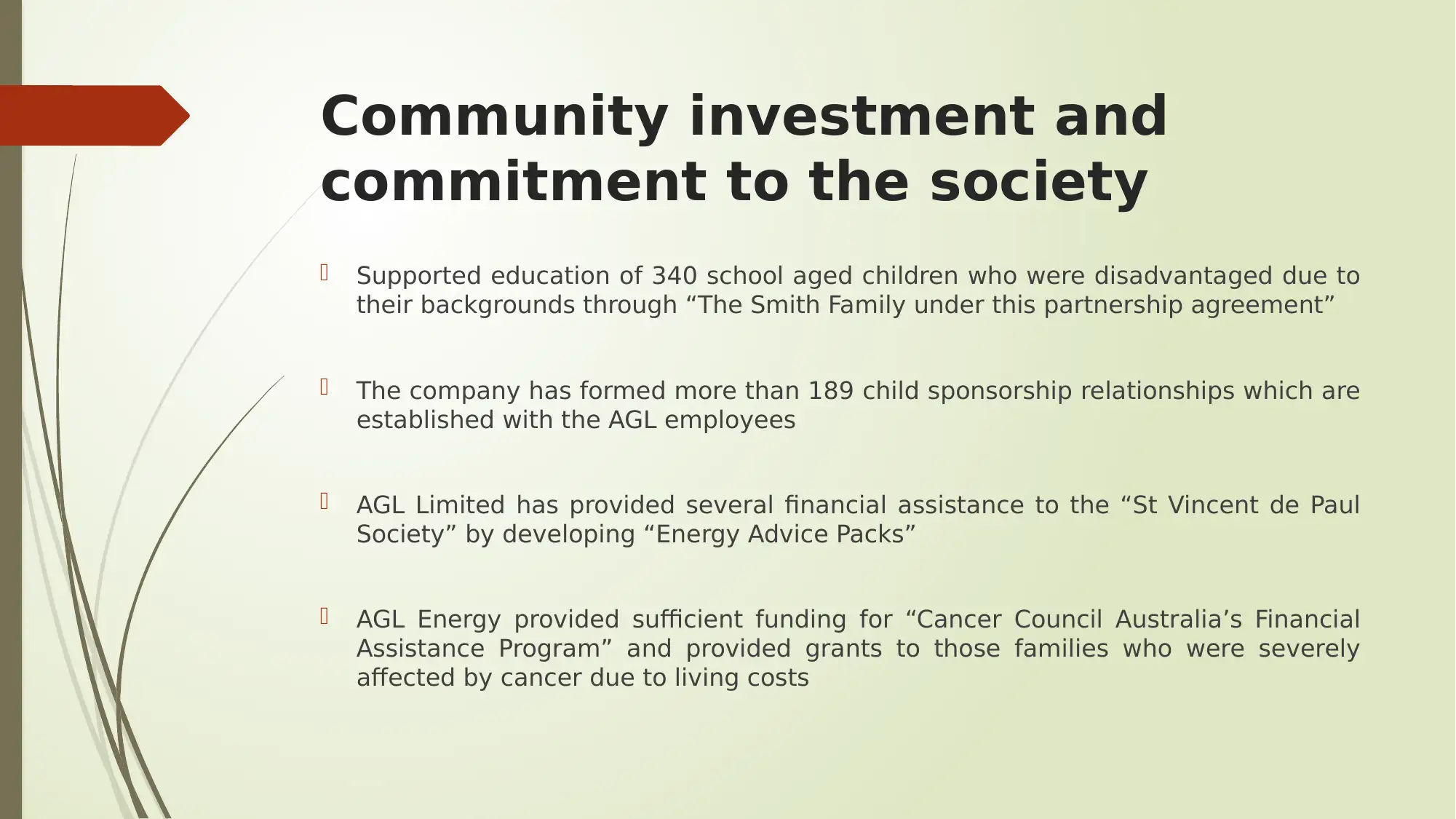
Community investment and
commitment to the society
Supported education of 340 school aged children who were disadvantaged due to
their backgrounds through “The Smith Family under this partnership agreement”
The company has formed more than 189 child sponsorship relationships which are
established with the AGL employees
AGL Limited has provided several financial assistance to the “St Vincent de Paul
Society” by developing “Energy Advice Packs”
AGL Energy provided sufficient funding for “Cancer Council Australia’s Financial
Assistance Program” and provided grants to those families who were severely
affected by cancer due to living costs
commitment to the society
Supported education of 340 school aged children who were disadvantaged due to
their backgrounds through “The Smith Family under this partnership agreement”
The company has formed more than 189 child sponsorship relationships which are
established with the AGL employees
AGL Limited has provided several financial assistance to the “St Vincent de Paul
Society” by developing “Energy Advice Packs”
AGL Energy provided sufficient funding for “Cancer Council Australia’s Financial
Assistance Program” and provided grants to those families who were severely
affected by cancer due to living costs
Paraphrase This Document
Need a fresh take? Get an instant paraphrase of this document with our AI Paraphraser
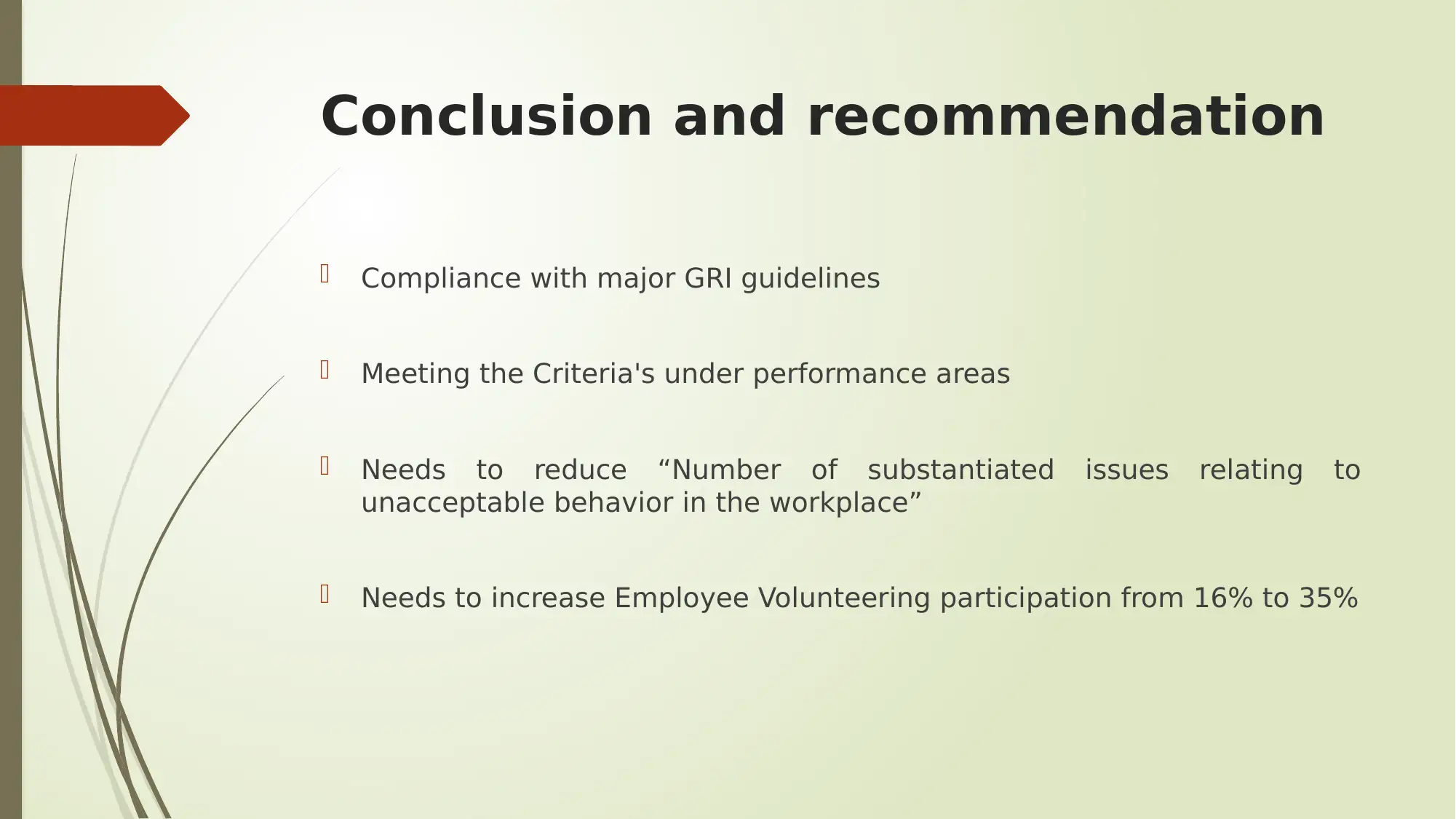
Conclusion and recommendation
Compliance with major GRI guidelines
Meeting the Criteria's under performance areas
Needs to reduce “Number of substantiated issues relating to
unacceptable behavior in the workplace”
Needs to increase Employee Volunteering participation from 16% to 35%
Compliance with major GRI guidelines
Meeting the Criteria's under performance areas
Needs to reduce “Number of substantiated issues relating to
unacceptable behavior in the workplace”
Needs to increase Employee Volunteering participation from 16% to 35%
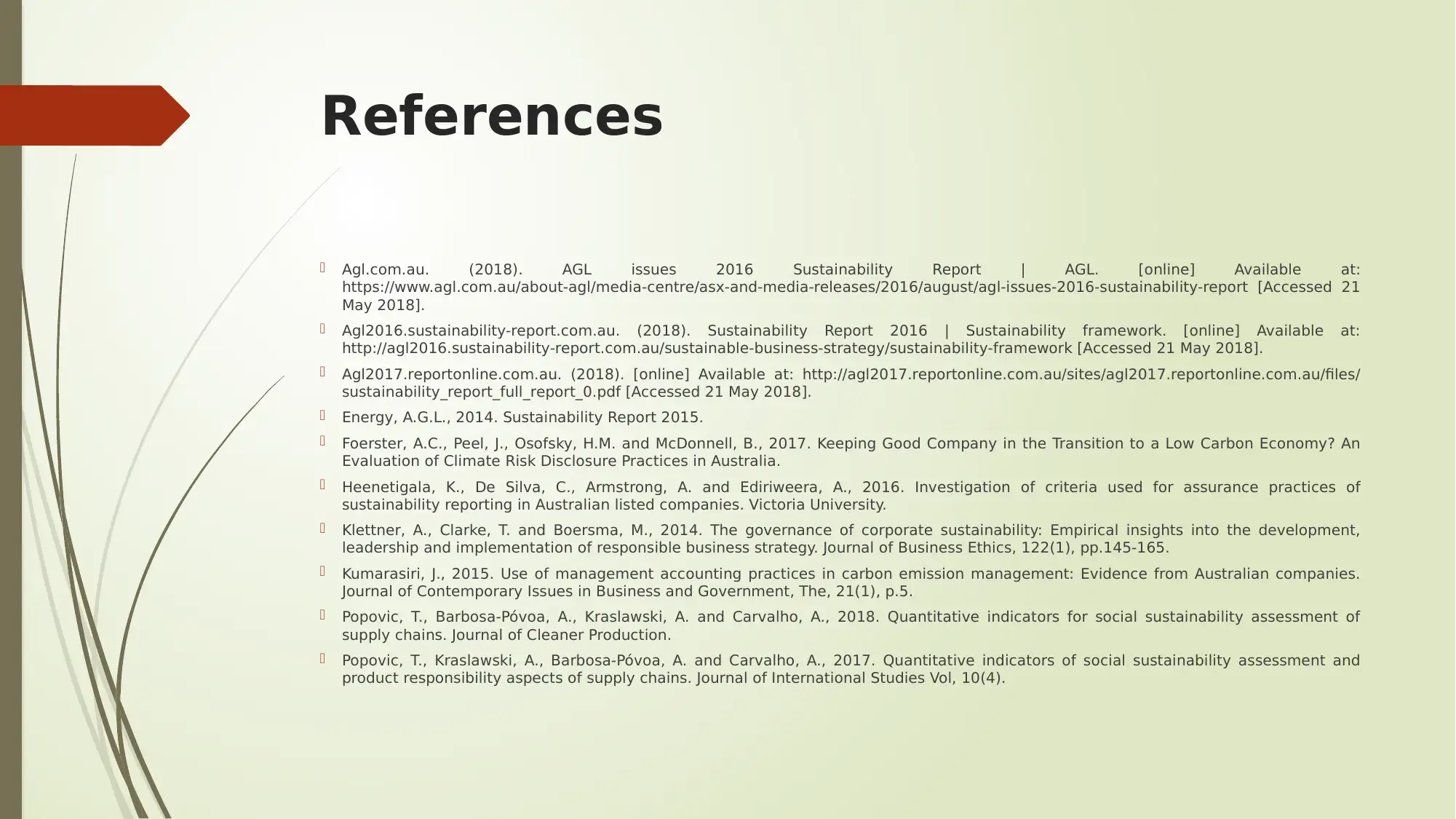
References
Agl.com.au. (2018). AGL issues 2016 Sustainability Report | AGL. [online] Available at:
https://www.agl.com.au/about-agl/media-centre/asx-and-media-releases/2016/august/agl-issues-2016-sustainability-report [Accessed 21
May 2018].
Agl2016.sustainability-report.com.au. (2018). Sustainability Report 2016 | Sustainability framework. [online] Available at:
http://agl2016.sustainability-report.com.au/sustainable-business-strategy/sustainability-framework [Accessed 21 May 2018].
Agl2017.reportonline.com.au. (2018). [online] Available at: http://agl2017.reportonline.com.au/sites/agl2017.reportonline.com.au/files/
sustainability_report_full_report_0.pdf [Accessed 21 May 2018].
Energy, A.G.L., 2014. Sustainability Report 2015.
Foerster, A.C., Peel, J., Osofsky, H.M. and McDonnell, B., 2017. Keeping Good Company in the Transition to a Low Carbon Economy? An
Evaluation of Climate Risk Disclosure Practices in Australia.
Heenetigala, K., De Silva, C., Armstrong, A. and Ediriweera, A., 2016. Investigation of criteria used for assurance practices of
sustainability reporting in Australian listed companies. Victoria University.
Klettner, A., Clarke, T. and Boersma, M., 2014. The governance of corporate sustainability: Empirical insights into the development,
leadership and implementation of responsible business strategy. Journal of Business Ethics, 122(1), pp.145-165.
Kumarasiri, J., 2015. Use of management accounting practices in carbon emission management: Evidence from Australian companies.
Journal of Contemporary Issues in Business and Government, The, 21(1), p.5.
Popovic, T., Barbosa-Póvoa, A., Kraslawski, A. and Carvalho, A., 2018. Quantitative indicators for social sustainability assessment of
supply chains. Journal of Cleaner Production.
Popovic, T., Kraslawski, A., Barbosa-Póvoa, A. and Carvalho, A., 2017. Quantitative indicators of social sustainability assessment and
product responsibility aspects of supply chains. Journal of International Studies Vol, 10(4).
Agl.com.au. (2018). AGL issues 2016 Sustainability Report | AGL. [online] Available at:
https://www.agl.com.au/about-agl/media-centre/asx-and-media-releases/2016/august/agl-issues-2016-sustainability-report [Accessed 21
May 2018].
Agl2016.sustainability-report.com.au. (2018). Sustainability Report 2016 | Sustainability framework. [online] Available at:
http://agl2016.sustainability-report.com.au/sustainable-business-strategy/sustainability-framework [Accessed 21 May 2018].
Agl2017.reportonline.com.au. (2018). [online] Available at: http://agl2017.reportonline.com.au/sites/agl2017.reportonline.com.au/files/
sustainability_report_full_report_0.pdf [Accessed 21 May 2018].
Energy, A.G.L., 2014. Sustainability Report 2015.
Foerster, A.C., Peel, J., Osofsky, H.M. and McDonnell, B., 2017. Keeping Good Company in the Transition to a Low Carbon Economy? An
Evaluation of Climate Risk Disclosure Practices in Australia.
Heenetigala, K., De Silva, C., Armstrong, A. and Ediriweera, A., 2016. Investigation of criteria used for assurance practices of
sustainability reporting in Australian listed companies. Victoria University.
Klettner, A., Clarke, T. and Boersma, M., 2014. The governance of corporate sustainability: Empirical insights into the development,
leadership and implementation of responsible business strategy. Journal of Business Ethics, 122(1), pp.145-165.
Kumarasiri, J., 2015. Use of management accounting practices in carbon emission management: Evidence from Australian companies.
Journal of Contemporary Issues in Business and Government, The, 21(1), p.5.
Popovic, T., Barbosa-Póvoa, A., Kraslawski, A. and Carvalho, A., 2018. Quantitative indicators for social sustainability assessment of
supply chains. Journal of Cleaner Production.
Popovic, T., Kraslawski, A., Barbosa-Póvoa, A. and Carvalho, A., 2017. Quantitative indicators of social sustainability assessment and
product responsibility aspects of supply chains. Journal of International Studies Vol, 10(4).
⊘ This is a preview!⊘
Do you want full access?
Subscribe today to unlock all pages.

Trusted by 1+ million students worldwide
1 out of 13
Related Documents
Your All-in-One AI-Powered Toolkit for Academic Success.
+13062052269
info@desklib.com
Available 24*7 on WhatsApp / Email
![[object Object]](/_next/static/media/star-bottom.7253800d.svg)
Unlock your academic potential
Copyright © 2020–2025 A2Z Services. All Rights Reserved. Developed and managed by ZUCOL.





